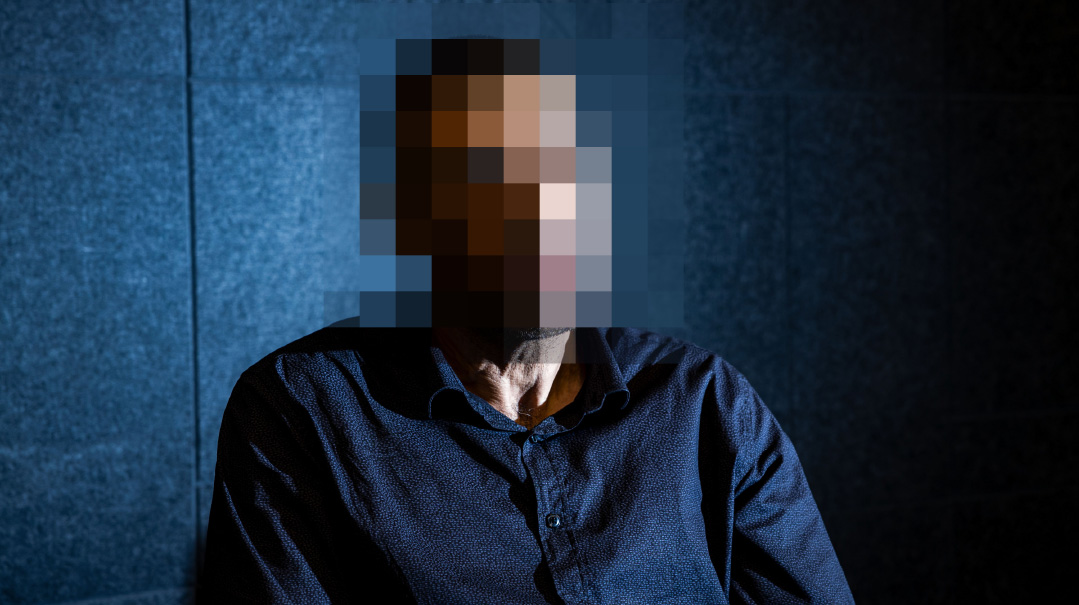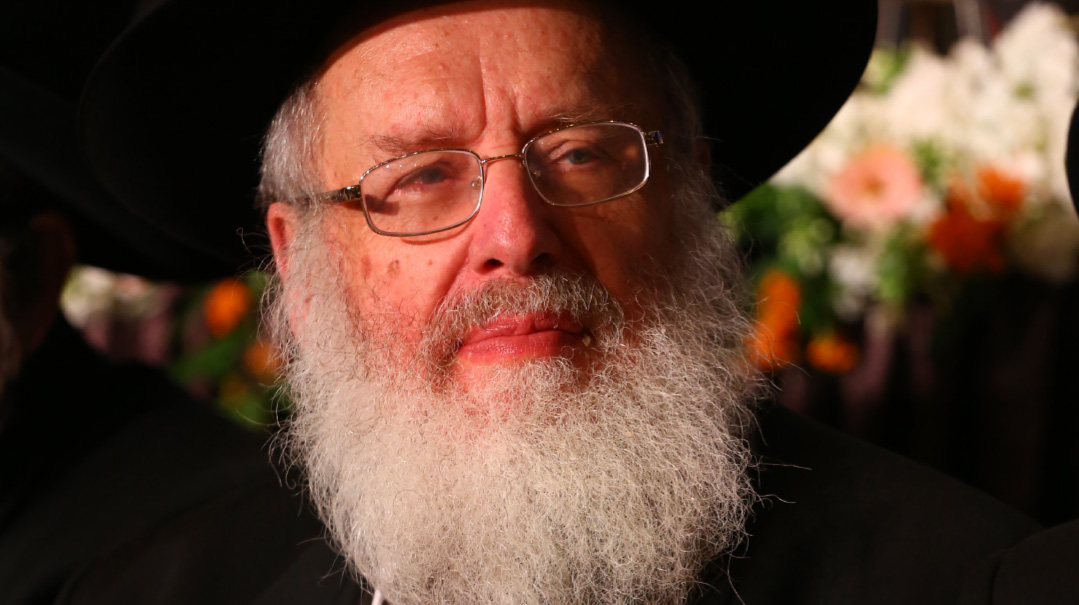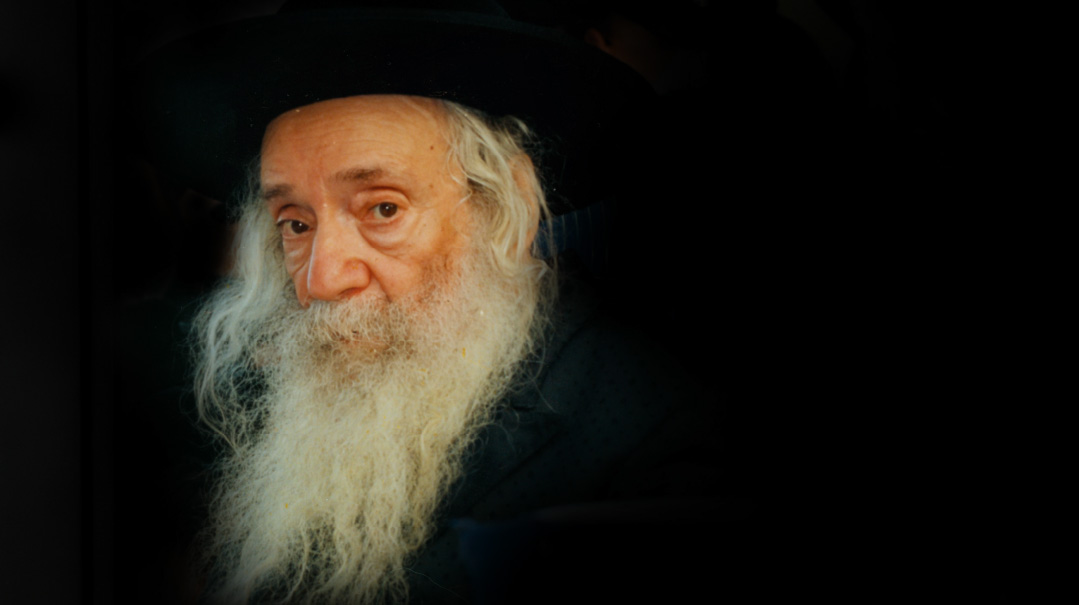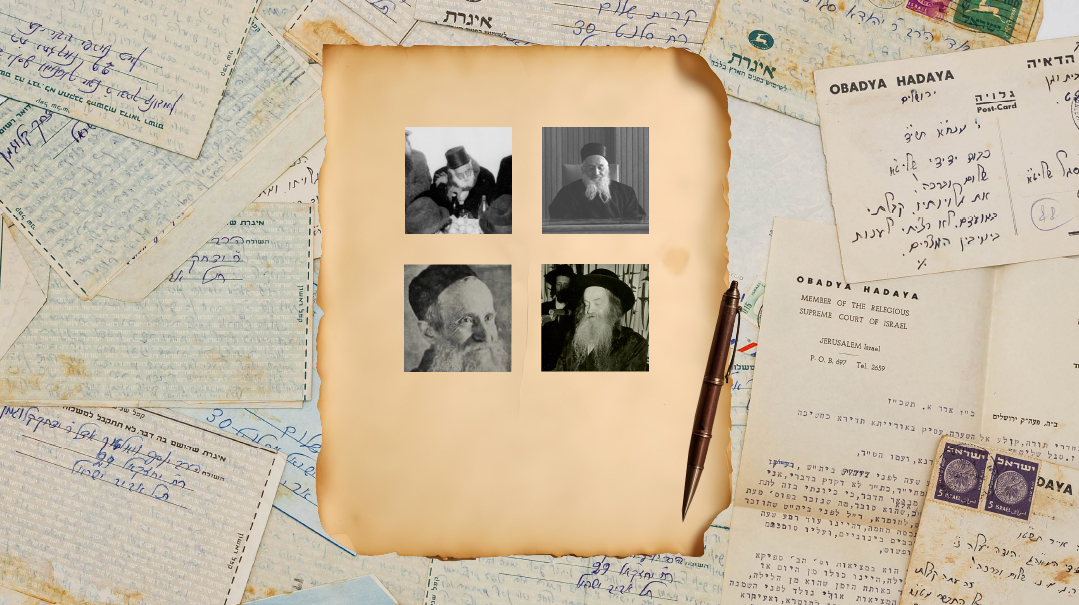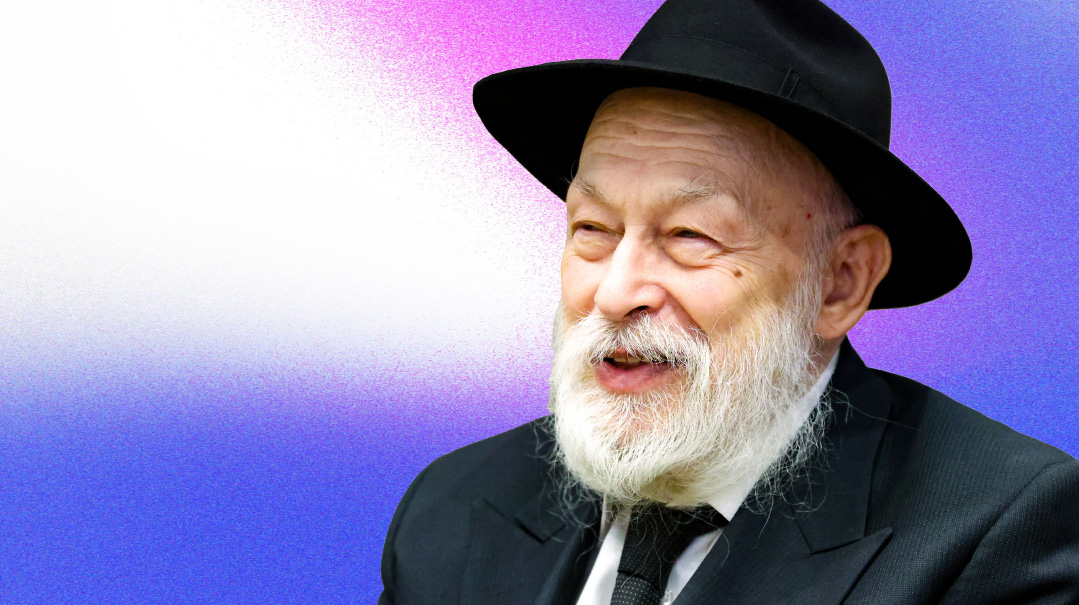Always My Malky


“I learned” says Avreimie with a sigh “how readily accessible the most dangerous narcotics are right here in Boro Park how simple it is to obtain them how there are dealers all over this neighborhood. We couldn’t do very much because to cut off the money would have forced Malky to come up with money on her own. We knew we didn’t want that” (Photos: Amir Levy Family archives)
A vreimie and Rivka Klein sit at the kitchen table as if meeting an insurance agent or contractor.
As if their world hasn’t exploded into a million little pieces.
As if the words of the past months — words meant to comfort stories of others who’ve lost and grieved compliments about their poise and dignity — have come close to reflecting their new reality when nothing could. Reality is suspended now because for so long in such a deep way their essence and identity and reason to live were the role they were given:
Malky’s parents.
So what now?
At this very table a commitment was made long ago a decision as hard as the tabletop’s marble.
And once it was made the Kleins never looked back.
Rivka Klein just a few weeks after sitting shivah for her beloved daughter Malky who died of a heroin overdose on June 29 looks up fire in her eyes.
“I don’t like when people say ‘Oh you did everything you could you’re such amazing parents you never stopped trying.’ You know parents with a child in Sloan Kettering lo aleinu sit there day and night and no one says they’re so amazing. They’re just parents. It’s what parents do.”
Avreimie gets up paces a bit sits down by the computer and now suddenly turns back to us. “Okay I’m ready ” he blurts out. “It’s worth the whole article if you can get out this one message. There is no such thing as a bad child. There are no bad kids.”
He refers to a recent video in which popular speaker Rabbi Yosef Yitzchak Jacobson told Malky’s story and drew relevant lessons.
“I watched it and then read the comments and I thought to myself ‘Wow. Some parents are lucky enough to be clueless. I’m happy for them. Others aren’t as fortunate.’ ”
He turns to face me a question in his eyes as if he’s searching for something dear and can’t find it.
“I once wrote an article in my mind the title was ‘Foresight Hindsight and Insight.’ Insight is actually getting it the reality of being inside the topic not outside.”
T
he dining room wall in the attractive Klein home in Boro Park features an exquisite picture of Rav Shmuel Tzvi Horowitz known as Rav Hershe’le of Spinka the rebbe of the Klein family.
“The Rebbe once advised a friend of mine to switch his son from a chassidish mossad to Torah Vodaath. I remember my surprise. I didn’t get it. I was blissfully naive. Some things you need to experience in order to understand.”
The pain that colors Avreimie Klein’s face subsides for a moment as he speaks of his rebbe.
“Years before we got into this… this… parshah ” he says shrugging as he comes up short in finding the right word “I got my marching orders from my rebbe.”
He goes back to a simpler time when his oldest son was very young and not particularly interested in attending the makeshift cheder in the bungalow colony where they spent summer vacation. “He didn’t want to go learn plain and simple. I was by my rebbe one evening and I told him about the situation. I mentioned that my son really wanted a new bike so I would use that as an incentive if he went to cheder nicely.
“The Rebbe listened to my idea. Then he said ‘Yes but buy the bicycle first. Let the child see it. Chain it to the house and tell your son that he’ll get it after cheder if the rebbi says he was a good boy. And then speak to the rebbi and make sure he finds some way that your son was good so that the boy gets to ride his new bicycle every day.’ ”
It was a revolutionary idea and it laid a foundation in Avreimie Klein’s mind the backdrop to advice he would receive many years later.
The Kleins took their children’s chinuch seriously, attending PTAs and working with the teachers to achieve maximum results. When their fourth child, Malky, was graduating nursery, Rivka Klein went to the end-of-year graduation.
Then, in kindergarten, the teacher called Rivka Klein to suggest that they get Malky evaluated by the Board of Education.
Dedicated parents, they brought Malky to the free Board of Ed evaluations. The diagnosis was that even though Malky was approved for extra help, she was a brilliant girl.
For the first few years of school, Malky left the class a few times a week for private lessons and extra tutoring, but she seemed happy. “She always had so many friends, she was popular and fun. And she was resilient, working through the scholastic struggles.”
M
alky Klein’s parents seem to recall every comment their daughter made, a musician’s ear for every note in that symphony of heartbreak.
Once, in second grade, the family was enjoying a Shabbos meal when Malky blurted out, “My teacher says I really belong in first grade.” Once she shared the information, Malky appeared to relax, as if the secret had been weighing on her. She wouldn’t forget it, however, until her final day.
Good parents, they arranged for tutors to help Malky with schoolwork.
“But we didn’t realize then that she had a real learning disability. She worked hard with the tutors, but looking back,” Avreimie says, “I can’t even imagine what it felt like for her. All day in school, which was painful, and then home for a few more hours of pain.”
One day, when Malky was in the sixth grade, the sweet, gentle child uncharacteristically shouted, “That’s it. I’m done with tutors. I can’t anymore.”
The schools were accommodating. They created a special class for the girls who needed extra help. “But of course, being pulled out created a stigma, a challenge of its own.”
Through it all, Avreimie recalls, he and his wife believed that the whole issue would pass, that Malky, with her emotional depth, eager mind, and sparkling personality, would come through the rough years stronger. “We saw how many friends she had, and knew our role was just to get her through the school years.”
There were other children at home, a business to run. The house did not yet revolve around Malky.
In eighth grade, Rivka recalls, Malky finally had “that teacher.”
“You know how you read about great teachers, the one who could make a difference?” Rivka allows herself a soft smile. “Malky found her teacher. The one who believed in her. The teacher, Mrs. Leah Handelsman, ‘got’ Malky. Malky recommitted herself to learning.”
“I have to say, there were several wonderful teachers along the way. I think about Ronit Polin, who was another bright spot in Malky’s life, and others who were so helpful along the journey.”
Eighth grade went nicely. In-school discussions were all about “next year,” and high school choices. Malky enthusiastically took part in these conversations, confident that she would join her friends in high school.
But the interview process didn’t go well, and hope was quickly replaced by frustration. When Malky finally did get invited to an interview, the prospective principal asked her what she was looking for in a school. “Honestly? I would go to any school that accepts me,” came the naive response.
Later on, Malky’s mother asked her why she’d said that, and she shrugged. “I don’t know,” she replied. It had just seemed the truth.
Mrs. Klein stands up and finds a letter Malky wrote to a friend on the last day of school. The handwriting is childish, exuberant, bursting with optimism. I’m going to miss you soooo much in the summer, ’cause we are going to high school together and we are going to have a blast. Hope ya have fun in Eretz Yisrael….
Everything was in place. A new start beckoned.
Except…
I
t was the day of Malky’s eighth grade graduation when the message came from the one high school that had actually accepted her.
Yeah, well, so that acceptance? Not really. Sorry.
The words might have been more formal, but the point was the same.
Her parents decided not to tell her. Rivka took Malky on a trip to Europe while Avreimie followed leads and called askanim and begged for meetings, trying to get her reaccepted in the first school, and eventually to find any school for his daughter.
“Forget acceptance — we couldn’t even get an interview.”
Avreimie’s voice is calm, controlled. “It’s very easy to get angry, but you can’t build with anger. We don’t blame people. I’m telling the story so that you can understand who Malky was, what was going on inside of her.”
On the first day of school, young girls in fresh, clean uniforms carried spanking new school bags down the Boro Park streets, but Malky Klein had no school to go to.
Finally, a few days into the semester, the Kleins found a school that would take Malky. “We were so excited for her. I remember, we wanted her to also enjoy that first-day-of-school feeling, even if it wasn’t really the first day, and we ordered her a beautiful new briefcase.”
They’d learned not to be too optimistic, but Malky’s parents looked on with hope as their daughter went off on that first day.
A few weeks later a phone call came. The principal grimly informed them that Malky wasn’t really adjusting. And she was breaking the rules. They were called in for a conference, and informed that Malky showed disdain for authority in several ways. First of all, she brought expensive nosh for snack. Also, she’d purchased an expensive birthday gift for a friend.
“Malky finally has a school and she’s eager to make new friends, so she bought a nice gift,” the mother argued.
“No,” the principal asserted, “she’s trying to ‘buy off’ other girls.”
Then, the principal charged, Malky had switched briefcases, further evidence that she was trying to create new standards in the school.
“No,” the parents argued, “it was just once. We’d ordered it when she was accepted and when it arrived, she switched, that’s all.”
The verdict was sealed.
Avreimie looked at the principal. “Okay. We get it. Just please don’t expel her until we find her a new school.”
They left the school and headed home, ready to start a new round of school-searching. When they got home, they found that Malky was already there.
She’d been expelled.
Malky lay on the living room floor, books fanned out all around her, as if she’d dropped them the moment she came in. Her parents look at the room, as if reliving the scene.
“She was crying, in such obvious pain and we, parents who just wanted to give her what she needed, weren’t able to help.”
Malky was broken. She would never really be whole again.
M
rs. Klein’s voice rises slightly. “My Malky, who loved to dress well, Miss Fashion, spent the next three months without a school —but wearing her uniform every single day. She would go to stores with me in her uniform. She wanted so badly to be in school, to look the part.”
She wanted, but there was no school that wanted her.
Midway through the year, an existing school fell apart and the administration split. A new school was forming, and they were ready to accept Malky.
Malky Klein had a school again, and determined to prove herself, she threw herself into her studies.
“We hired tutors,” recalls her mother, “and Malky would rush in from school, grab a bite, and hurry out to study. At home, she always had a book in her hands, cramming information.”
“We had real nachas,” her father says, allowing the sentence to hang there for a moment before finishing, “but we didn’t realize that it’s like a car that’s overheating. It was too much for a little girl.”
At the end of ninth grade, Malky came home with a good report card. It was a new experience for the young girl and her parents.
“We were excited for her, and even though we knew she wanted to go to one of the schools of her choice and rejoin her friends, we encouraged her to wait until she had good marks for a sustained period, until her confidence was restored.”
But she couldn’t wait anymore. Being normal was simply too exhilarating a prospect. Unbeknownst to her parents, Malky marched herself into the office of the principal in the school where her friends were and made her pitch.
The night before she’d gone, she’d carefully written down the things she wanted to say to the principal.
Avreimie goes to the computer to pull up the notes that Malky prepared before that meeting, talking points for her appeal. Yet another exhibit in the chronicles of a broken heart.
Please here me out. Before telling me no for the best reasons please give me a chance.
It doesn’t matter who somebody may have bin, it matters who they want to be. Who I want to be is the best I can be. I want to grow and change and work harder, I want to c what I’m capable of cause I bet it’s a lot…. I want to go to this school more than I’ve ever wanted anything…. I’m not a faker, I mean it…. Please, please give me a chance, please take it into consideration to except me for the 10th grade…. I know school starts in less than two weeks but in five seconds anything can happen….
Thank you for listening to me….
The principal was polite, but firm. There was no space.
The new school year began. Malky wasn’t herself. She returned to the original school, but she was already burned out — she’d worked too hard, invested too much, only to be denied the privilege of being “normal,” in a mainstream high school with her friends.
Night after night, she and her father would sit in the living room and talk, really talk. One night, she looked him in the eye and said, “At least put me in public school. Then I’ll know that I have a place.”
Another night, she wept and finally managed a single sentence. “It takes me hours to do what other kids can do in a few moments.”
Her father listened and reassured and encouraged.
But it wasn’t enough to keep Malky, Malky.
I
t happened so quickly. She was done. She’d given up. She forgot about school and found a new identity in the streets. Friends, it turned out, gave validation more readily than teachers. When Malky smiled, the chein was still there, but she smiled less and less.
The parents couldn’t do much. Reb Hershele Spinker had already left this world, and Avreimie went to speak with the Rebbe’s son, the Krule Rebbe, Rav Naftali Horowitz.
The Rebbe sent Avreimie into the dark shadows just beyond the pale of the conventional frum community, where angels operate. There, the Kleins heard about a new approach to dealing with struggling children.
“Really,” Avreimie says, “it was just an echo of what I heard from my rebbe about the bicycle years earlier. If a child feels loved, there’s a chance, but once he or she doesn’t have that stability, then rules and red lines and ultimatums won’t work.”
Avreimie found mentors advocating for the path of unconditional love. Malky had been broken and the only thing that could make her whole again would be unconditional love and support. Otherwise, they’d only push her further away.
Avreimie, the sort of person who does things correctly, faced this new challenge as if it were a business venture or home-improvement project, gathering as much information as possible.
“I was trying not to get emotional, to develop the right tools to help Malky. Period.”
He heard about an older chassid who’d faced chinuch struggles with a child decades ago, back before there were books and support groups. The confused father had benefited from the guidance of the Spinka Rebbe.
“I tracked him down and he recalled how he’d told the Rebbe about how his son was bringing negative influences into the house.
“Uber ehr iz in der heim,” the Rebbe said. But he’s at home.
The father told the Rebbe that the son was doing serious aveiros.
“Uber in der heim.”
He’s at home.
The Rebbe had told the father that no matter what, a child’s place is near his or her parents, connected to them. Avreimie and Rivka remember a conversation with a leading educator and advocate for these children.
“It was an intense, long conversation. He opened our eyes to a new way of seeing Malky, of seeing life. I told him how bright and capable our other children were,” Avreimie says, looking down as he speaks, “and he said, ‘If so, can you imagine how much more difficult things are for Malky? Not only is she learning disabled, she’s surrounded by geniuses, so she always feels that something’s wrong with her.’
“Malky told me one night that Steve Jobs had also dropped out of high school, so she had a new role model, evidence that you can succeed without high school. I told our mentor how I answered Malky that Jobs had dropped out of college, which was different. I guess I was proud of my answer, and I noticed that he sighed. ‘What, it was a bad answer?’ I asked him.
“My mentor looked at me. ‘She had one lifeline, something she was holding on to that gave her security and reassured her she could still be successful, that it was worth the fight. And you ripped it away from her.’ ”
T
hese parents who’d been feeling powerless for so long now knew what they had to do.
“Remember that first shopping trip?” Avreimie says, looking across the table at his wife.
She squares her shoulders, as if recalling the tenacity it took. “I do.”
Malky’s mother drove her to Manhattan, to the Abercrombie and Fitch store. “I remember how dark it was, the bizarre smells and strange music. It was a new world. Malky was choosing clothing for her new life, and I stood there crying in the darkness, then smiling broadly as we walked back to the car.”
Malky made new friends.
“We weren’t naive. We were able to smell her clothing when she came home, we saw her eyes. But we’d already learned that if we weren’t her full support system, she’d find support elsewhere, and that wasn’t something we wanted.”
The next few months brought a new kind of terror.
“We literally worried for her life, all day, all night. She was out and often in dangerous places,” Rivka Klein says. “I remember how I looked up to heaven and said, ‘Ribbono shel Olam, there are three partners in a person. My husband and I can’t do anything. You have to keep her safe.’ ”
The late-night conversations continued, perhaps with a new intensity.
One night, Avreimie looked at his daughter. “You used to be so happy. What happened?”
“Tatty!” she answered with force, “I never had a happy day in my life. It was a facade. I was broken inside.”
“I feel your pain,” Malky’s father said empathetically.
Malky stood up, furious. “Don’t say that! You can say you care about me and that you worry for me, but you don’t know what it’s like to feel stupid every day of your life.”
That summer, Malky was registered in Camp Extreme and her parents planned a much-needed vacation. They landed in Eretz Yisrael and got an urgent message to call the camp. Malky, it turned out, wasn’t just using drugs, she’d been using heroin, which is highly addictive and highly dangerous.
It was a dark new chapter, the hardest one yet.
T
he new year brought fresh worries. Malky wasn’t doing well, and no one was more aware of it than her.
Malky thought that having a dog would make her happy.
“I remember the conversation in my brain,” Rivka says, offering a halting smile. “My husband was, of course, all in, but it took me a bit longer. I was really terrified of dogs. I knew we would do it in the end, but I had to motivate myself.”
This nice heimish family from 57th Street in Boro Park became dog owners, the father with the beard and shtreimel often taking the pet for a walk.
“She was in so much pain, and the drugs gave her a temporary reprieve, but she knew what she was doing to herself. In the too-brief interludes between uses, she was her sweet self, the smile and consideration and love. So much love,” Rivka says, shaking her head, “as if to reassure us that the drugs weren’t really her.”
Eventually, Malky announced that she felt ready for rehab.
California suddenly became as common on the Klein family itinerary as the corner grocery store.
Malky settled into the new facility, determined to start again.
“If you’d have asked others, they might have said she wasn’t frum,” her father reflects, “but we looked on in awe at her resolve. She fought to keep kosher in a facility where she was the only one. They had these gourmet meals three times a day and she would cook herself these prepackaged meals. She lit Shabbos candles on Friday evenings, bringing light into the darkest place in the world. And when Yom Kippur came, she fasted.
“She asked us to send a siddur. I figured she meant a machzor, but my wife said no, she said a siddur, send a siddur.”
Deep in an emotional valley, Malky found a way to climb mountains. She started taking art classes.
Rivka sighs. “Some of those early pictures were disturbing. They revealed her pain, but they were all extraordinary. Earlier in her life, in school, she’d taken art classes, and the teacher told her she wasn’t following the rules. ‘But isn’t art a kind of personal expression?’ Malky had asked. Now, we finally saw her feel free to express herself.”
After 13 months in rehab, Malky was clean, ready to start again.
She chose to remain in California. She’d made friends there and become close to local Chabad shluchim, Rabbi and Mrs. Ilulian.
There were good days, but also hard ones. Malky rose, but she also fell.
After a year of being clean, she lapsed again.
She was in the hospital after a drug overdose, her father sitting at her side. His rebbe, the Krule Rebbe, called to check in. “Take some coffee and warm it in the microwave, and leave it on the tray next to her,” the Rebbe advised.
Avreimie was surprised, because Malky wasn’t awake, and even when she would waken, she wouldn’t drink the coffee.
The Rebbe explained. “When she opens her eyes and reaches out, she’ll feel a hot cup of coffee and she’ll get the message, she’ll feel the warmth. Tatty is there. Things will be okay.”
There is a video on Rivka’s phone, taken a few months after that incident. Malky was back home in Brooklyn and she’d overdosed again. She was in Maimonides Hospital, and the Krule Rebbe came to visit.
In the video, Malky looks so vulnerable and weak, but the respect and sincerity as she sees the Rebbe is evident.
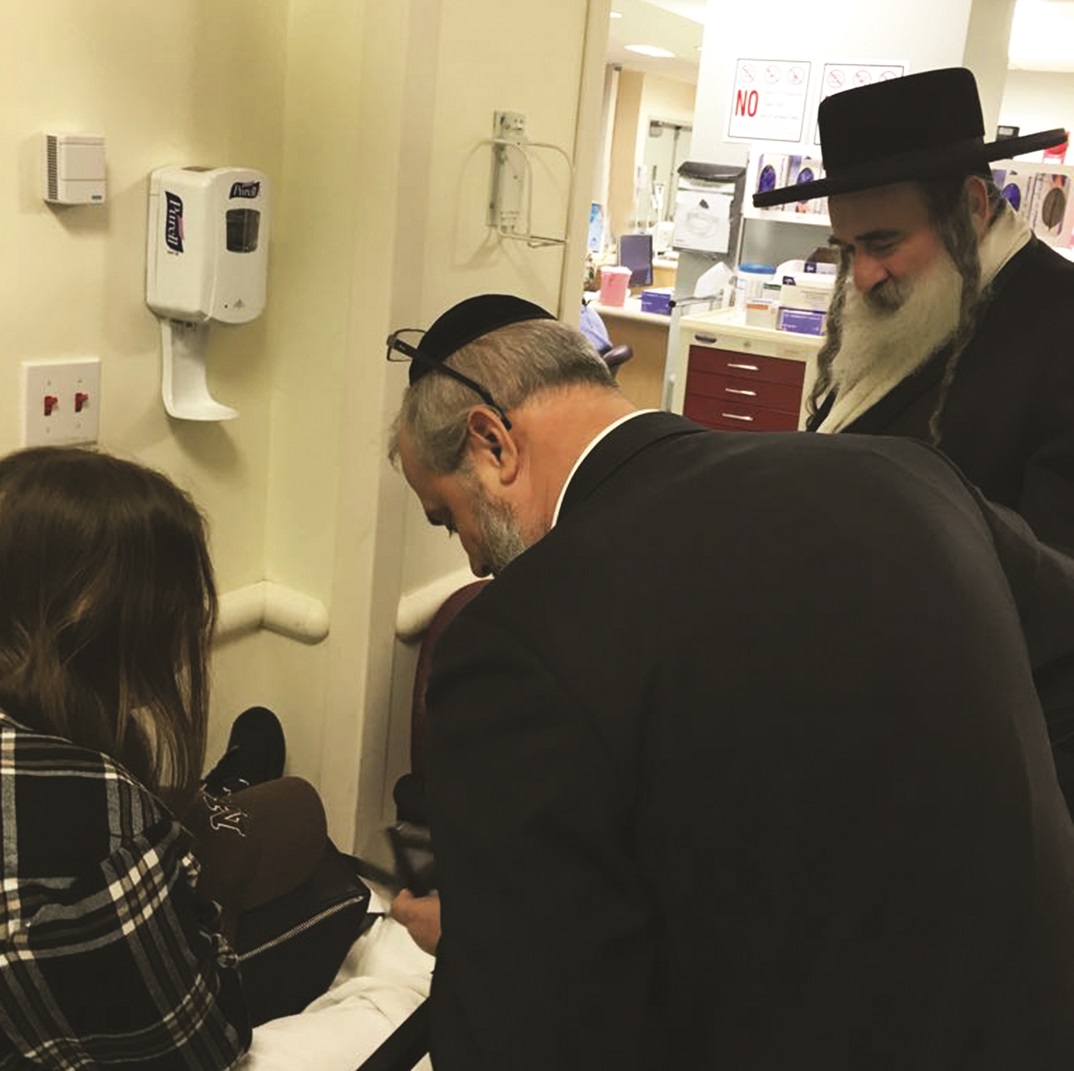
“One Erev Rosh Hashanah, the Rebbe sent her a package with apple and honey to California, and on Purim,” Avreimie recalls, “the Rebbe left her a message, wishing her a gut yohr. She saved the voice mail and played it over and over, crying every time she listened.”
In California, Malky was torn. Brooklyn was a scary place to her, but she missed her parents fiercely. She would FaceTime them several times a day, speaking with her siblings again and again.
Rivka reaches for the phone to show me a message in which Malky shares a link to a song, “Hamalach Hagoel Osi.” This made me think of you, she writes.
Of her parents. And maybe also of bedtime, as a child, when everything still seemed possible. When sweet dreams were still within reach.
A
fter the second stint in rehab, Malky was clean again. She came back to Boro Park, back home.
As in earlier years, Malky bonded with her parents, late nights on the comfortable living room couch.
“She cried a lot, about life, about what had happened to her and to other people.”
It was a strange time. Malky was sick, slipping into drug use, her addiction filling the gaping hole inside her, but even as she fell deeper into the abyss, her relationship with her parents was strong.
“Her emunah was also strong. She would often speak about how things don’t happen by chance, and her social media posts also reflected her faith. I remember,” Avreimie says, he and his wife exchanging a long look before he’s able to continue, “I remember picking her up from Newark on a Friday. It was late in the day and there was lots of traffic. She asked me why I didn’t go into the HOV lane, and I explained to her that in California, two people are enough to be considered a car pool. In New York, however, the lane is only open to three passengers.”
Malky looked at her father. “Tatty, we have three. Me, you, and Hashem.”
For that beautiful moment, Malky was back.
This past Shavuos, Malky was in California, joined by the whole family. Her younger sister moved into her room and watched as Malky wrote a card to accompany a Yom Tov gift purchased for her mother.
Malky’s frail shoulders shook with emotion and she sobbed as she wrote:
Growing up, you were my Mom. Now you’re my Mom and my best friend. You always want to make things better for me, even when you can’t… I treasure every phone call, text, and conversation we have, treasure our relationship, and love who you are. You accept and support every part of me….
A text message to her father carried a similar message. I just wanna let you know how much I appreciate your support in everything I do. I appreciate your acceptance of me staying true to myself and my beliefs. I notice and remember everything you do for me constantly, on a daily basis. I always trust in G-d’s plans for me — there was no one better or more perfect to be my father than you. I am so grateful for you. I love you so much it hurts….
A
s spring progressed, Avreimie looked his daughter in the eye. She was seemingly clean of drugs, but there had been a minor relapse. “We all know how dangerous this game you’re playing is, the self-medicating. If something happens, chas v’shalom, we want you right here, in our arms.”
After Shavuos, Malkie returned home. Those final weeks at home were very special. Even as she basked in the warmth of family, she was saying goodbye. It was a nightmare for her parents — they had her close, but she was slipping away.
“I learned,” says Avreimie with a sigh, “how readily accessible the most dangerous narcotics are right here in Boro Park, how simple it is to obtain them, how there are dealers all over this neighborhood. We couldn’t do very much, because to cut off the money would have forced Malky to come up with money on her own. We knew we didn’t want that.”
The last Thursday of her life, Malky came into the kitchen while her mother was baking challah. She happily joined in, davening as she took challah. On Friday night, she came into her parents’ bedroom and lay down. She cuddled with her mother, like a small child, and then embraced her father. She was exulting in the experience of just being close with them. It was a final gift. A final message, too.
She left after the Shabbos seudah, returning home near Shalosh Seudos time and sitting on the porch with her mother, chatting easily and warmly. Avreimie went to shul for a shiur, and Rivka prepared to visit a friend.
Before leaving, Rivka went upstairs to say goodbye to Malky, and saw her daughter lying in bed. Malky’s skin was blue and she wasn’t breathing.
Hatzolah came. Avreimie rushed home.
Little Malky was gone.
And this time, there was nothing her devoted parents could do to make things right.
T
he levayah was Sunday, and within days the secular media was running stories on heroin addiction in the chassidic community.
For a brief moment, the all-knowing commenters were quick to judge: of course, chassidic parents. Brooklyn. Typical. Certainly, they’d applied pressure, rejected her, been too demanding.
And then Malky’s story came out, the tale of a sweet, proud young girl broken a hundred times. The social media comments by Malky’s friends testified to the powerful bond she had with her family.
“I was in mourning, consumed by my own pain,” Avreimie says of the shivah. “I didn’t hear noise from outside. I was waiting for my own message from the Ribbono shel Olam.”
It came in the form of a routine WhatsApp video that randomly appeared during the shivah, a short clip of Rabbi Manis Friedman speaking about raising successful children. “The only barometer of success,” Rabbi Friedman said, “is right versus wrong, not successful versus failure. If you did the right thing, you were a successful parent, and if not, you were a failure.”
It resonated.
“I knew we’d done our best. My wife, Malky’s siblings, her grandparents, all of us. The results may not have been the ones we hoped for. The approach, unconditional love, acceptance, working to make a child whole again, has saved so many of these kids. So many families we know have been healed. It didn’t work for Malky, but it gave us a daughter until the end, gave her parents every step of the way. We know we did the right thing for her, again and again.”
M
alky had been the goal, the endgame, to so many of her parents’ decisions over the past 20 years, and now it’s been pulled away from them.
“We have memories, and we feel grateful. Not every parent can look back at a loving relationship. Not every parent gets to see how special their child is,” Avreimie says, standing on his front porch, speaking in the slow, measured tones of someone who is working valiantly to keep it together. “We looked at her as a fighter, a champion, not a problem.”
And the attitude they had then gives them strength now.
“We feel like we want to build, to keep alive that part of us that Malky woke up. She was our inspiration and she is our inspiration.”
They’ve invested personal resources, energy, time and — most precious to them — Malky’s legacy, into creating something positive.
Yedidyah is an early-intervention organization in Eretz Yisrael — but its professionals aren’t looking for speech defects or strange movements. They are trained to see the tiny, imperceptible warning signs of a neshamah in pain and provide guidance and clarity. Malky’s parents are bringing the organization to America.
“Malky had it all,” Avreimie says, looking past me, somewhere else. “Parents and siblings who loved her, a great personality, friends, an appreciation for life. But with all that, we were powerless to help her.
“But that doesn’t mean we can’t help others. She couldn’t stand to see people suffering. It’s what she would want from us.”
The Kleins haven’t withdrawn from the community of parents united by shared challenge. “We know. We feel like we can help others. We’ve been there. We get it. Until that final moment, we never felt like we lost our daughter. She was never anything but our precious Malky.”
I walk back to the car, but Avreimie stands still. The bright sun plays tricks with the image of Malky’s father. I can’t see his eyes anymore, but I can still see his resolve as he grips the railing, as if we can both hear the whisper carried by the gentle breeze, Malky’s enduring message: I notice and remember everything you do for me constantly, on a daily basis. I always trust in G-d’s plans for me, there was no one better or more perfect to be my father than you. I am so grateful for you.
(Originally featured in Mishpacha Issue 672)
Oops! We could not locate your form.

